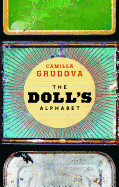
Weirdness is the rule, not the exception, in Camilla Grudova's strangely affecting short story collection, The Doll's Alphabet. These 13 stories have been published in magazines like Granta and the White Review, and their cumulative effect is uncanny. This is partly because of the macabre subject matter and partly because Grudova's style is untethered from the conventions of realism. Dolls, corpses, vermin, wolves and various mythical creatures make appearances; Grudova is a magical realist who introduces supernatural elements matter-of-factly. At the core of her stories, though, are human characters with real human needs.
In "Waxy," factory-bound, meat-rationing women are trained to take care of their men at all costs. The story feels as though it's set in the early 20th century--a gramophone is likened to "a grand rotting flower"--but with a sly feminist critique conveys near-future dystopian anxieties about the role of women in society. Grudova's imagination runs wild in stories like "The Sad Tale of the Sconce"; perhaps never before has a story about war and shipwrecks been told from the perspective of a wall sconce. "Notes from a Spider"--about a half-man, half-spider celebrity who falls in love with a sewing machine--is likewise bizarre yet boasts certain bewitching charms. Taken together, the stories in The Doll's Alphabet spin morbid magic. --Scott Neuffer, writer, poet, editor of trampset

